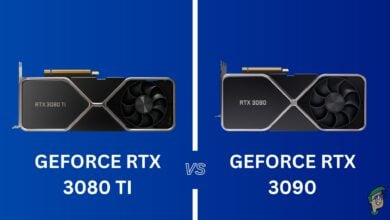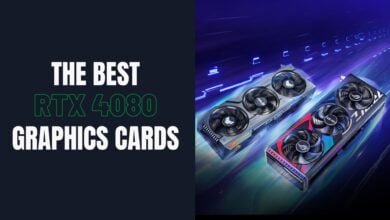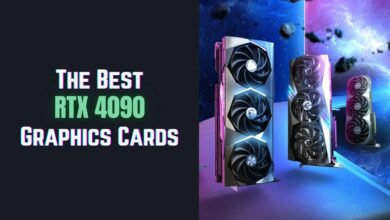Best AMD Radeon RX 7600 Graphics Cards In 2024
AMD Radeon RX 7600 graphics cards are here, and they look like they are going to be quite a decent option for 1080p gaming. While the state of graphics cards has been quite disappointing so far in 2024, things aren’t looking too bad for the budget market. Still, due to the current pricing and Nvidia’s questionable launches, nearly every new GPU gets a lukewarm reception when announced.
The best RX 7600 graphics cards consist of the Navi 33 GPU at the heart of the new GPUs. It is built on AMD’s latest RDNA3 architecture with the addition of new AI Cores, 2nd Gen Raytracing, and 2nd Gen Infinity Cache. All of that sounds great, but is it worth picking up at MSRP considering the VRAM issue that is plaguing modern Triple-A titles?
In this roundup, that’s the question we’ll be trying to answer while also looking at some of the best AMD RX 7600 graphics cards available to buy right now. We’ll be testing a number of cards and comparing the performance, features, and thermals against each other to figure out which one is worth your money.
Before we move, we’d also like to mention that this card is very close in price to the best RX 6700 XT Graphics cards. Keep a close eye on the prices and performance differences between the two so you get the best deal.
| # | Preview | Product Name | Award | Details |
|---|---|---|---|---|
| 1 | 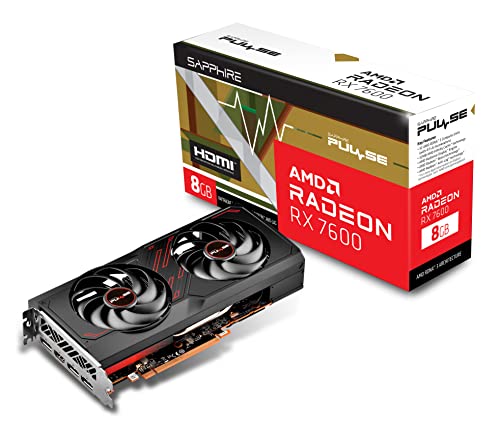 | Sapphire Pulse AMD Radeon RX 7600 Graphics Card | Editor's Choice | Check Price |
| 2 | 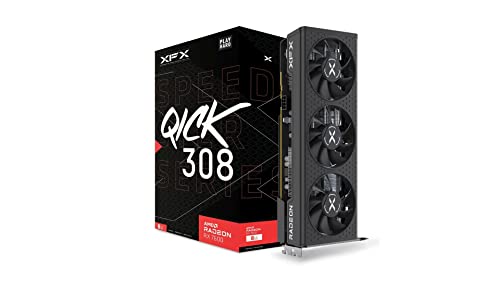 | XFX Speedster QICK308 Radeon RX 7600 Graphics Card | Best Triple-Fan RX 7600 Graphics Card | Check Price |
| 3 | 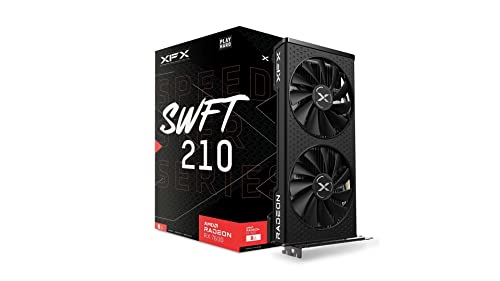 | XFX Speedster SWFT210 Radeon RX 7600 Graphics Card | Sleekest Design | Check Price |
| 4 | 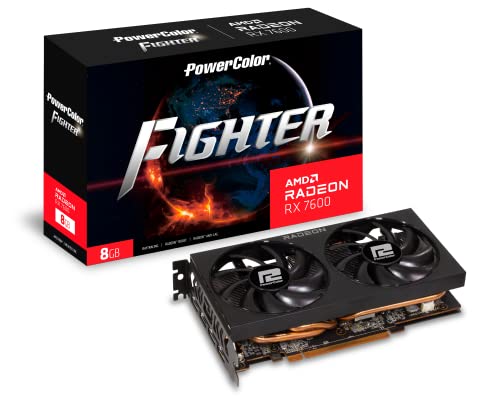 | PowerColor Fighter AMD Radeon RX 7600 Gaming Graphics Card | Best for Thermals and Noise | Check Price |
| 5 | 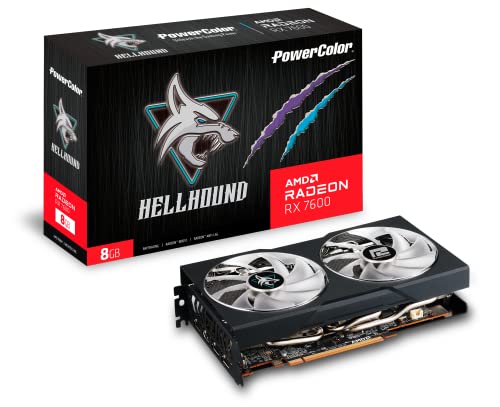 | PowerColor Hellhound AMD Radeon RX 7600 Gaming Graphics Card | Best for Small Form Factors PCs | Check Price |
| # | 1 |
| Preview |  |
| Product Name | Sapphire Pulse AMD Radeon RX 7600 Graphics Card |
| Award | Editor's Choice |
| Details | Check Price |
| # | 2 |
| Preview |  |
| Product Name | XFX Speedster QICK308 Radeon RX 7600 Graphics Card |
| Award | Best Triple-Fan RX 7600 Graphics Card |
| Details | Check Price |
| # | 3 |
| Preview |  |
| Product Name | XFX Speedster SWFT210 Radeon RX 7600 Graphics Card |
| Award | Sleekest Design |
| Details | Check Price |
| # | 4 |
| Preview |  |
| Product Name | PowerColor Fighter AMD Radeon RX 7600 Gaming Graphics Card |
| Award | Best for Thermals and Noise |
| Details | Check Price |
| # | 5 |
| Preview |  |
| Product Name | PowerColor Hellhound AMD Radeon RX 7600 Gaming Graphics Card |
| Award | Best for Small Form Factors PCs |
| Details | Check Price |
Last Update on 2024-10-27 at 14:40 / Affiliate links / Images from Amazon Product Advertising API
Factors to Consider When Buying The Best AMD Radeon RX 7600 Graphics Card
While you’re on the hunt and choosing from the best AMD Radeon RX 7600 graphics cards, there are several factors that you need to consider. A good GPU will give you consistent framerates across the board, while also maintaining consistent performance in terms of thermals and acoustics. However, that’s only possible if you know what you’re looking for when buying a graphics card.
Higher-End GPU Roundup: 9 Best NVIDIA RTX 4090 Graphics Card In 2024
With that being said, it can sometimes be a bit of a hassle to find the right graphics cards for your needs. While Radeon RX 7600 graphics cards are excellent for gaming, you’ll need to take factors such as compatibility, performance, thermals, and cooler design into account. Sticking with our recommendations is a good idea, but that might not always be possible. Products often go out of stock, get discontinued, or increase in price. In that case, we’ve put together some factors that you should be aware of so that you get the best deal.
After testing several RX 7600 graphics cards and sifting through all the different AIB designs, we came across some obvious factors that can make or break a good graphics card. These are the things that you should do when you’re planning on getting an RX 7600 graphics card for your gaming PC.
Compatibility
This is true for the best AMD Radeon RX 7600 graphics cards but also applies to any video card in general. Before you go about buying a GPU, make sure that it is compatible with your case and power supply. Most ATX and Micro-ATX cases should have no problem with fitting in a dual-slot or even a triple-slot graphics card. Triple-card fans can be relatively long and heavy, so make sure that your case has enough room to house it comfortably.
Of course, this won’t be as big of a problem when you’re buying an RX 7600. It’s a budget gaming GPU, so it’s usually smaller than something like a 4070 or 4080. Just keep in mind that some bigger GPUs will not fit into ITX cases at all. You’re better off getting a dual-fan design or a low-profile compact graphics card.
Once you’ve figured out compatibility with the case, you’ll need to worry about the maximum power draw of the GPU. The RX 7600 has a TDP of 165W. However, at full load, it can draw 15-20W more than that. The average still sits at a comfortable 165W. This means that you can get away with a relatively low-tier power supply with a total power of 450W. Higher-end GPUs like the 3080 need a beefier power supply, so it’s good to see that you won’t need to upgrade your PSU.
With that said, even if you can get away with 450W, we don’t recommend that. That sort of wattage is enough for low-end systems, but if you have a relatively powerful CPU along with other power-hungry components, things are going to be tight. It’s also not a good decision if you plan on upgrading in the future. For that reason, we recommend that you have at least a 500-550W power supply for this graphics card.
CPU Bottleneck
If you’re buying this GPU, it is highly likely that you will be playing games at 1080p. On lower resolutions, games are more CPU-bound than GPU-bound. If your CPU is not strong enough, you’re going to face stuttering, frame drops, and other performance issues. That’s why it’s important to calculate the bottleneck between your CPU and GPU.
Generally speaking, if you pair the Radeon RX 7600 graphics card with a relatively modern CPU with six cores, you should be good to go. Even 4-core CPUs like the Core i3 13100F or the Core i3 12100F will be fine. However, if you have something older like an i3 9100F or an i5 6600K, it’s a good time to upgrade. You can get a decent CPU for $100-$150 these days. For example, the Ryzen 5 5600X is the best option. Finding motherboards for the 5600X is relatively easy as well.
Finally, you should also make sure that you have enough RAM for the CPU to take advantage of. In 2024, 8GB of memory is cutting it very close. You should at least have 16GB of RAM for Triple-A titles, as that tends to be the sweet spot these days.
Thermal and Acoustic Performance
When most people buy a graphics card, they tend to focus on the specs and performance. While that’s a valid approach, considering the thermal performance is just as important. A lot of these newer graphics cards rely on thermal data to properly boost to max speed. This is also known as GPU boost.
Fortunately, as the RX 7600 graphics card does not draw too much power, this is not something to worry about. Even though modern GPUs can be sensitive to temperature, the RX 7600 boosts very well. It also has a good bit of room for overclocking and such. Just keep in mind that the airflow in your case can heavily affect the overall performance. If your components are tightly packed into a small case, you will notice higher temps and performance issues.
Acoustic performance goes hand in hand with thermal performance. A lot of cards these days are known to have issues with coil while. It’s a power-related issue that’s caused by electric surges. It causes capacitors to vibrate at a high frequency, and this sound is known as coil whine. Check reviews for any graphics card that you plan on buying to make sure it does not have this issue.
Aesthetics
While not everyone thinks that aesthetics is as important as performance, a lot of people will beg to differ. Aesthetics impact the look of your rig but also say a lot about how much you care about your rig. A good-looking card can make your build look incredible, and it’s nice to show off your gaming station every now and then.
Fortunately, graphics cards come in all shapes, sizes, and colors. A lot of the best RX 7600 graphics cards have a sleek black look, but we are yet to see variants with a lot of RGB. Of course, that is to be expected with budget and mid-range cards, so you’ll have to make do with the aesthetics. Still, there are some exceptions. The ASROCK Steel Legend and Gigabyte OC variants are good examples. Unfortunately, those cards are not yet available in most retailers.
Price and Value
This can be a bit tricky when it comes to third-party vendors for graphics cards. Each variant will differ in pricing depending on the raw performance, thermal performance, and design. It’s relatively easy to find video cards near the recommended MSRP point. A lot of them are priced exactly at MSRP. For a budget card like the RX 7600, this should not be much of a problem.
Vendors such as PowerColor, Sapphire, and XFX all have cards that are at MSRP or at least close to it. You’ll see this for yourself when we get to the roundup. Of course, we also have high rollers. Premium variants of these cards show off the best of the best from these vendors. This includes cards like the ASUS ROG Strix or MSI Suprim for cards like the RTX 3070.
However, since the card we’re looking at today is a budget variant, this is less of an issue. Manufacturers simply don’t produce these higher-end variants for these budget cards. If you do come across a few exceptions, you’ll notice that they’re relatively higher in price. Try to find the right balance between price and performance. If you spend too much, you’ll find that you could have bought a higher-tier card by paying a tad bit more. It’s a common mistake made by many, so be wary of this.
Why You Should Trust Us
At Appuals, we are dedicated to providing you with the most reliable and informative reviews on all graphics cards. Our team of experienced PC hardware enthusiasts tests each product diligently. We always take factors such as performance, pricing, thermals, and acoustics into account to make sure our readers buy the best product that fits their budget. We understand the importance of reliability when it comes to video cards and our extensive testing reflects our high standards. Read more about us.
1. Sapphire Pulse AMD Radeon RX 7600 Graphics Card
Editor's Choice
Pros
- Great cooling performance
- Classic Sapphire design
- Competitive price
- Works with almost any case
Cons
- Color scheme might be boring to some people
Shading Units (Cores): 2048 | Boost Clock: 2644 MHz | Memory: 8GB GDDR6 | Power Connectors: 1x 8-pin | Outputs: 1x HDMI 2.1, 3 x DisplayPort 2.1
Kicking off the list is the Sapphire Pulse AMD Radeon RX 7600. When it comes to reliability, performance, and value, this is arguably the best RX 7600 Graphics card that money can buy. It’s excellent for 1080p gaming, features that classic design we’ve seen from Sapphire in the past, and the thermal performance is superb.
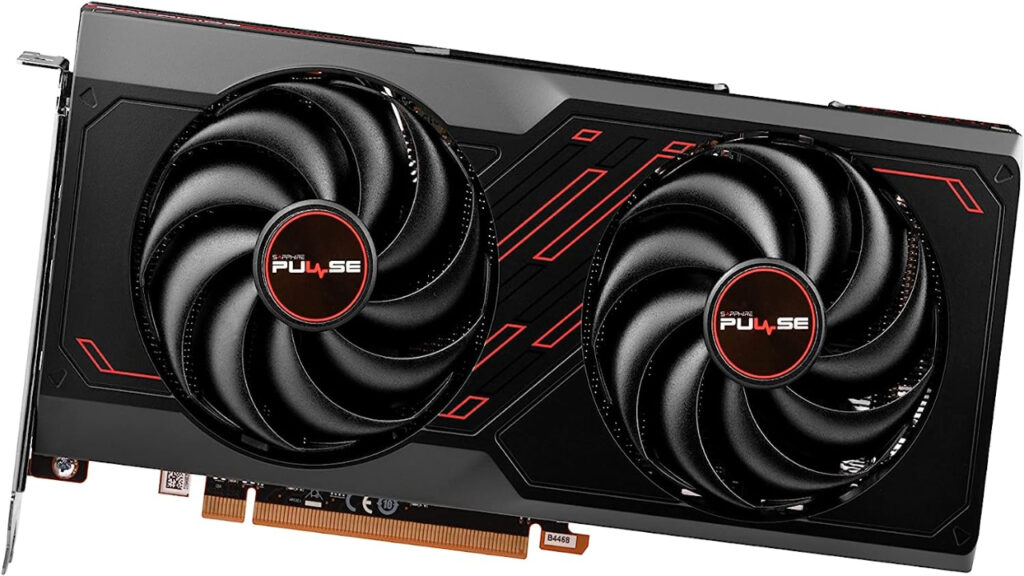
Like all RX 7600 graphics cards, this one features 8 Gigabytes of GDDR6 memory and is based on the RDNA3 architecture. In terms of design and build quality, the Sapphire Pulse features a sleek design with high-quality materials all around. It features a dual-fan design that keeps the card cool even during intense gaming sessions. For the NAVI 33 GPU inside, the composite heat pipes and fans are fine-tuned for maximum heat dissipation. This ensured that thermal performance is as expected.
More Budget GPUs: Best RTX 3060 Graphics Cards for Entry-Level Gaming PCs
In terms of performance, the Sapphire Pulse delivers on our expectations. Performance in games is great at 1080p, and while the RX 7600 is not intended for ray tracing, it’s a great GPU for eSport titles. As for the video output, it features an HDMI 2.1 output as well as three DisplayPort 2.1 outputs. The card also supports PCIe Express 4.0, allowing for faster data transfer speeds.
The only con with this one is that it has a bit of a generic color scheme. For most people, the black/red combo is played out at this point. As such, the design might bore some people away. However, considering that this a cheap card that delivers on performance without sacrificing thermals, that’s a minor drawback. We highly recommend this card, especially since it’s near MSRP.
One more thing worth mentioning is that if you buy certain AMD cards on Amazon right now, you’ll get a free copy of the Resident Evil 4 remake. That deal also applies to this card, making the value even better.
2. XFX Speedster QICK308 Radeon RX 7600 Graphics Card
Best Triple-Fan Option
Pros
- Triple-Fan design
- Incredible cooler performance
- Lots of room for overclocking
- High factory boost clock
Cons
- Unuseable for ITX cases
Shading Units (Cores): 2048 | Boost Clock: 2755 MHz | Memory: 8GB GDDR6 | Power Connectors: 1x 8-pin | Outputs: 1x HDMI 2.1, 3 x DisplayPort 2.1
The XFX Speedster QICK308 takes everything that’s great about the best RX 7600 graphics cards but turns things up a notch. It has a higher factory clock, a beefy cooler, and a sleek triple-fan design. This QICK308 is the ultimate form of this GPU. The sleek design and performance speak for themselves.
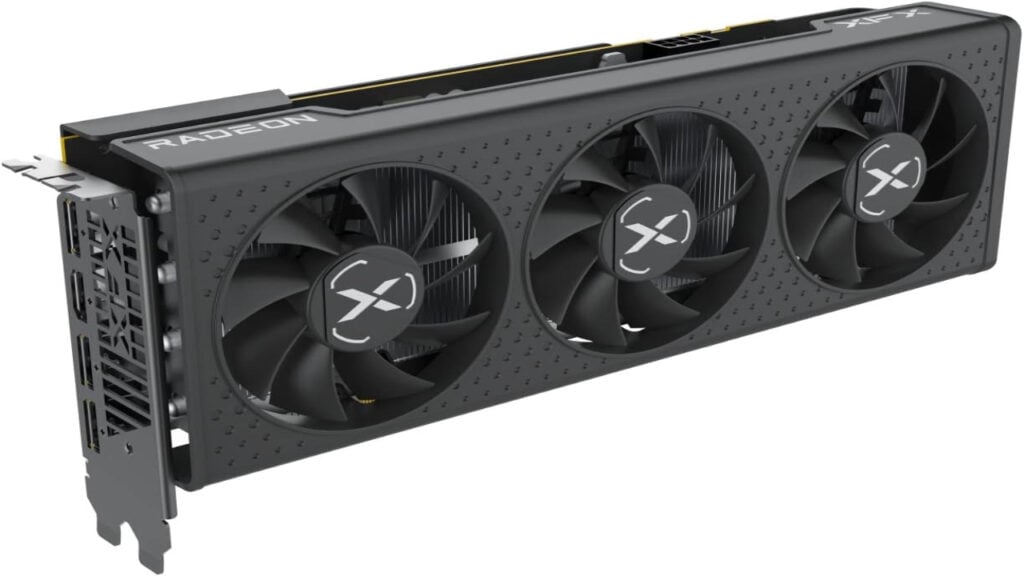
It features a modern and slick design that is both aesthetically pleasing and great for cooling. The card uses high-quality materials along with a triple-fan design that leaves a lot of room for incredible. Thermally, this card has no issues keeping up with the performance. That’s likely why it features a slightly higher boost clock at 2755. With good airflow in your case, you should have no problems overclocking this beast to an even higher boost clock.
With a little bit of memory overclocking, you’re looking at almost 6700 XT-like performance. The only thing that’s holding it back is the 8GB of VRAM. But we can’t really blame XFX for that, as that’s all that AMD has given them to work with. This behemoth of a GPU will look stunning in a stealthy case, maybe even with a little bit of water-cooling thrown into the mix.
It certainly looks more expensive than it actually is. If aesthetics mean anything to you, then this is the obvious card to buy. It will work with almost any build, and since black goes with everything, you’ll have an easy time building a color scheme around this card.
Other than that, there’s no noticeable coil whine and the fans are almost silent even under full load. The design is a bit overkill for the Navi 33 GPU, but considering it’s still cheap, we’re not complaining. If you have an ITX case, you might want to avoid this one because of the size. For ATX and microATX cases, this is a budget dream come true.
3. XFX Speedster Swift 210 Radeon RX 7600 Graphics Card
Sleekest Design
Pros
- Sleek design
- Great for small form factor PCs
- Great thermal performance
- Works with most Linux distros
Cons
- Not the best for overclocking
Shading Units (Cores): 2048 | Boost Clock: 2655 MHz | Memory: 8GB GDDR6 | Power Connectors: 1x 8-pin | Outputs: 1x HDMI 2.1, 3 x DisplayPort 2.1
Under the hood, the XFX Speedster Swift 210 is just your ordinary RX 7600 graphics card. It features the same 8GB of VRAM, 2048 shading units, and a TDP of 165W. What makes it stands out from the competition is its slick and aesthetically pleasing design. In terms of design, this is the best RX 7600 graphics card out there. The Swift 210 is powerful, looks great, and works with a wide variety of cases.
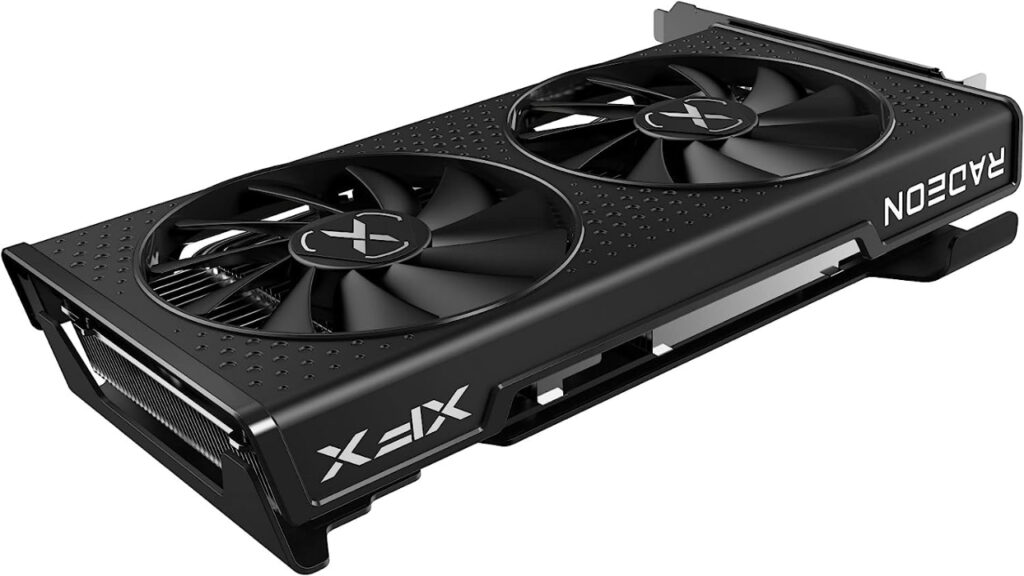
XFX has nailed its design philosophy perfectly with the Swift series. In a world where everything is about RGB, this GPU takes a stealthier approach with its looks. It features an all-black design apart from the white Radeon and XFX branding. Those subtle white accents give this GPU a lot of personality, and this also shines through with the backplate.
The backplate features a cutout XFX logo along with a perforated design. The heat pipes aren’t that visible either, which further adds to the stealthy look. Other than that, it features an aggressive angled design that complements the almost industrial appearance.
This is a dual-fan card that should have no problem fitting into almost any case. It works well with budget PC cases while also adding to the looks. Apart from the design, the dual-fan cooler construction does a great job of keeping the card cool under full load. It doesn’t have much in the way of overclocking headroom, but the fact that this one works flawlessly with most Linux distros is another plus point.
All in all, if you care about the design and want the sleekest-looking RX 7600 on the block, this is your answer. It might not be as impressive as the XFX’s triple-fan card that we looked at above, but it certainly looks even better.
4. PowerColor Fighter AMD Radeon RX 7600 Graphics Card
Best for Thermals and Noise
Pros
- Small footprint
- Great thermal performance
- Overclocks quite well
- Very Quiet
Cons
- Boring and generic design
- Basic-looking backplate
Shading Units (Cores): 2048 | Boost Clock: 2655 MHz | Memory: 8GB GDDR6 | Power Connectors: 1x 8-pin | Outputs: 1x HDMI 2.1, 3 x DisplayPort 2.1
The PowerColor Fighter is a formidable contender for being one of the best RX 7600 Graphics cards. While there’s not much difference in terms of the specs and performance, this GPU sets itself apart thanks to its outstanding thermal and noise performance. This is the best that we’ve seen so far on this list, apart from the triple-fan XFX QICK308.
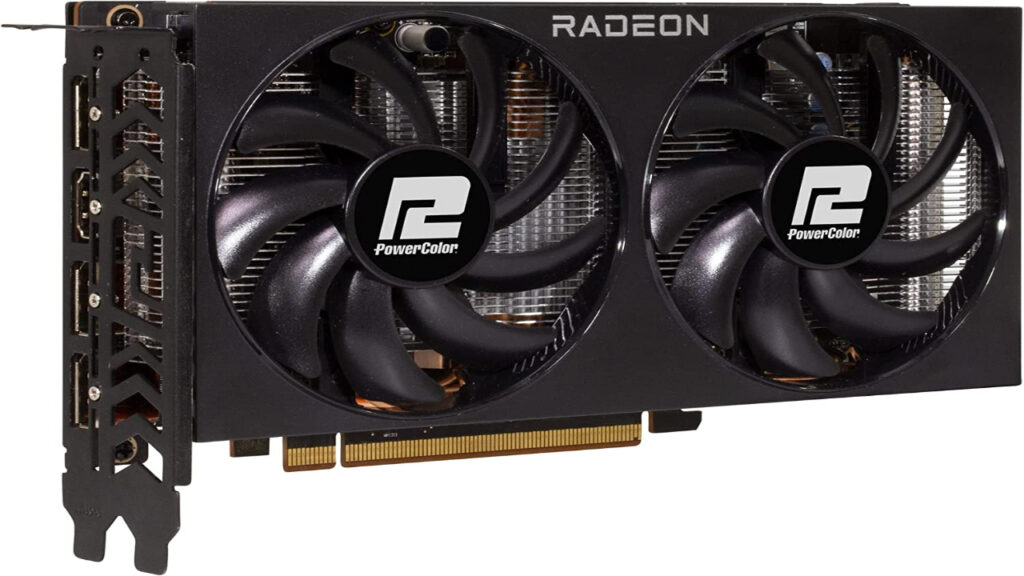
Let’s dive into the Fighter’s impressive thermal management. Equipped with an advanced cooling system, this card ensures optimal temperatures even during intense gaming sessions.
The dual-fan configuration works wonderfully with the precision-engineered heat pipes, effectively dissipating heat away from the NAVI 33 GPU. This results in improved thermal efficiency, allowing the Fighter to maintain consistent performance without compromising stability.
More GPU Roundups: 7 Best RTX 3060 Ti Graphics Cards In 2024
Apart from the thermals, another impressive feature is the whisper-quiet operation. The cooling fans are intelligently designed to minimize noise while effectively cooling the card. Whether you’re engrossed in an intense gaming session or working on resource-intensive tasks, the video card won’t annoy you with coil while or loud fans.
In addition to its remarkable thermal and noise performance, the Fighter boasts excellent overclocking capabilities. Enthusiasts seeking that extra performance boost will be pleased with the headroom this card provides. With careful tweaking and monitoring, you can extract additional power from the Fighter and achieve even better framerates.
While it exceeds the technical aspects, it does have a few drawbacks in terms of design. First off, it is very boring and generic at first glance. You can’t shake that feeling even when you’ve had the card for a while. It’s easy to tell that this is a budget card. While that’s not always a bad thing, it doesn’t even look similar to the cards we looked at above.
This one is definitely for those who care more about having better thermals and acoustic performance, as well as room for overclocking. If you’re looking for great design, you want to go for the XFX Speedster. Still, this is an excellent RX 7600 Graphics card considering it’s very close to MSRP.
5. PowerColor Hellhound Radeon RX 7600 Graphics Card
Best for Small Form Factor PCs
Pros
- Perfect for compact PCs
- Superb cooling performance
- Overclocks well enough
- Backlit fans
Cons
- Coil whine
- Fans can get loud
Shading Units (Cores): 2048 | Boost Clock: 2695 MHz | Memory: 8GB GDDR6 | Power Connectors: 1x 8-pin | Outputs: 1x HDMI 2.1, 3 x DisplayPort 2.1
The PowerColor Hellhound has quite an aggressive name, and it’s fitting for a card that features superb cooling performance. Like the PowerColor Fighter above, this one has a lot of thermal headroom allowing you to overclock the GPU as much as you’d like. If you’re looking for a compact graphics card that doesn’t compromise performance, this is the one to get. However, there are a few issues that might hold you back.
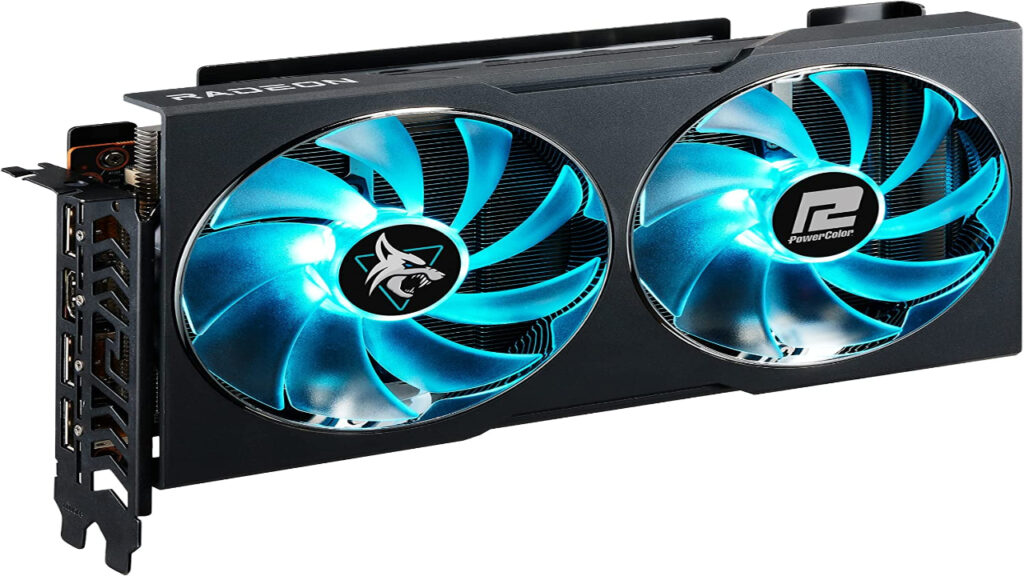
One of the standout features of the Hellhound is its compact size, making it an ideal choice for space-constrained builds. Whether you’re constructing a mini-ITX gaming rig or looking to optimize airflow in a smaller case, the Hellhound should fit with no problems.
Despite its small size, the Hellhound doesn’t skimp on cooling performance. The dual-fans do a great job along with the heat pipes to dissipate heat and keep temperatures in check. You can easily push this RX 7600 graphics card to its limit without worrying about overheating issues.
Looking for more performance? Check out the Best RTX 3080 Graphics Cards For 4K Gaming.
While it may not offer extreme overclocking potential, it does provide sufficient headroom for users to squeeze out additional performance. With careful tweaking and monitoring, you can optimize the card’s settings to unleash its full potential.
Adding a touch of visual flair, the Hellhound features backlit fans. The fans are accented by LEDs that light up in a subtle icy blue color. Not exactly the color we’d choose for an AMD build, as blue is Intel’s color, but it looks good nonetheless.
While the cooling performance is incredible it does come at a cost. These fans tend to get quite loud, and there’s a noticeable coil whine with this GPU. However, you can quickly adjust the fan curve and make them quieter.
With that said, not everyone is going to be familiar with that. Most people just want a card that they can plug in and enjoy without worrying about stuff like this. That’s the only reason why this card is at the bottom of our list. Other than that, it’s still a decent option.
How We Picked and Tested the Best Radeon RX 7600 Graphics Cards
As Nvidia’s 40-series appears to be quite unpopular right now, we reckon that this sub-$300 graphics card from AMD is going to be very popular. Normally, picking from various different aftermarket variants of a GPU is very difficult. However, this entire ordeal was easier than usual considering that there were only a handful of these variants available with most retailers.
Our primary factor to consider was the thermal performance. Most graphics card variants perform about the same, and the only thing that separates the best RX 7600 graphics from the rest is how well they perform thermally. Of course, acoustic performance is also just as important. You don’t want something that ends up sounding like a jet engine when it’s at full throttle.
Apart from that, power delivery and power consumption is not as big of an issue with these cards. Considering the RX 7600 has a relatively low power draw of 165W, we rarely noticed any power spikes when testing with various different PSUs. Aesthetics are subjective, but we did pay attention to them as a lot of people care about design and build quality.
Ultimately, the price tag and value proposition are what really matters. In our opinion, the best card is one that looks good, performs well, and is close to the MSRP. Each of our RX 7600 cards more or less fit those standards and our time of highly skilled experts put them through a rigorous testing process. The thorough gauntlet of testing involved thermal, acoustic, as well as performance tests in various real-world scenarios.
At the end of it all, our time of hardware experts, writers, and editors got together to curate the ultimate guide to the best RX 7600 graphics cards out there. The results are driven by a lot of data, feedback from users, as well as subjective opinions from our writers and editing team.
The VRAM Situation with the Best RX 7600 Graphics Cards And Benchmarks
Before you buy any new graphics card, it is important to check how much VRAM you currently have and how much you would need in the future so that the upgrade is actually substantial. While the RX 7600 is an excellent card for 1080p gaming, there is valid concern around the VRAM limitations. For once, both AMD and Nvidia seem to be in agreement. The situation is that both companies believe that 8GB of VRAM is enough for 1080p gaming.
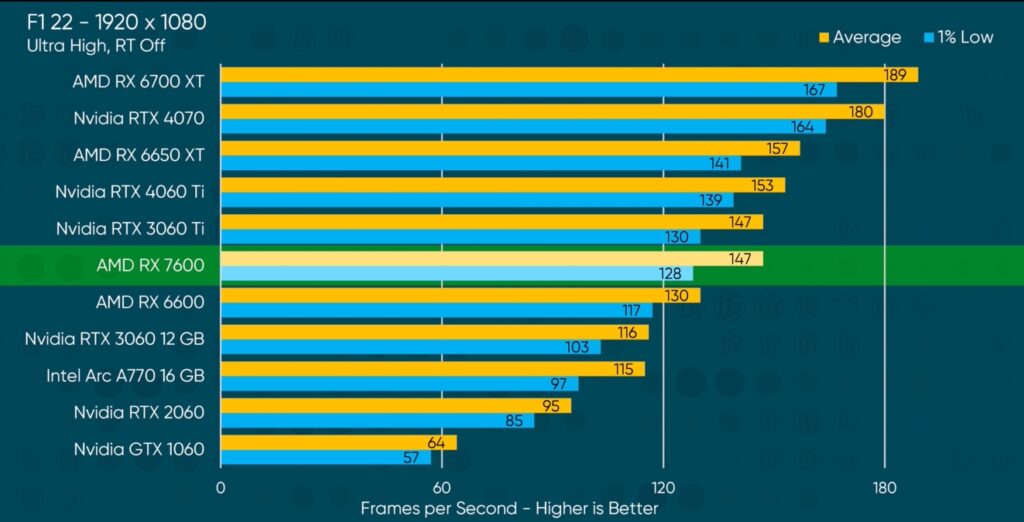
While that’s mostly true, considering that a lot of newer Triple-A games are being developed for next-gen consoles that have 16GB of VRAM, that statement is a bit skewed. A lot of Triple-A games are made for consoles first, and then later ported to PC. Consoles are the bigger market, so it makes sense why this is the case. However, it’s very difficult to optimize a game for PC hardware. This is especially true considering how many different configurations of gaming PCs exist in the world.
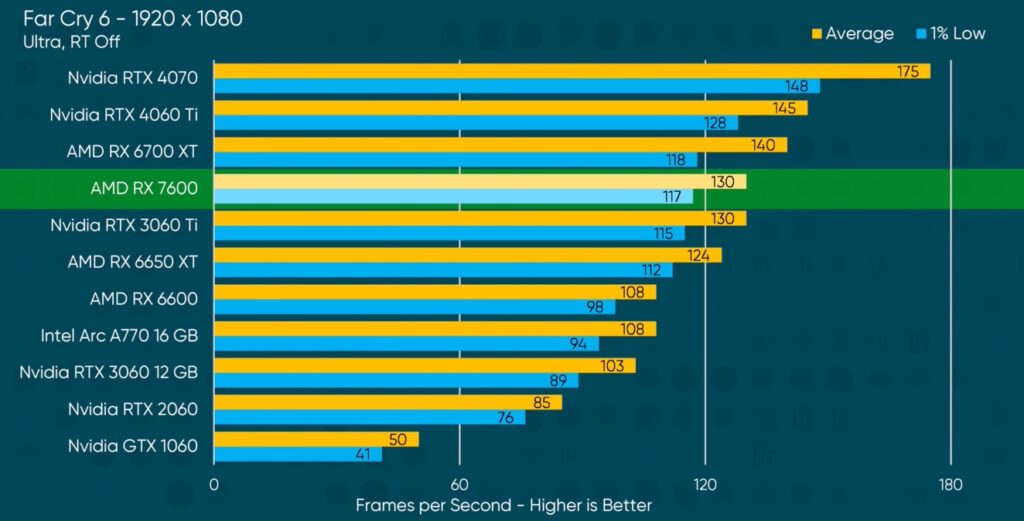
As such, a lot of games have been recently pushed out to the PC world that demand more VRAM. Games like The Last of Us Part 1 Remake, Star Wars Jedi: Survivor, and The Callisto Protocol all use more than 8 gigs of VRAM at certain resolution. This is also true for 1080p. There’s a growing list of games that use more than 8GB VRAM, with titles like Dead Space Remake using up to 13 gigs!
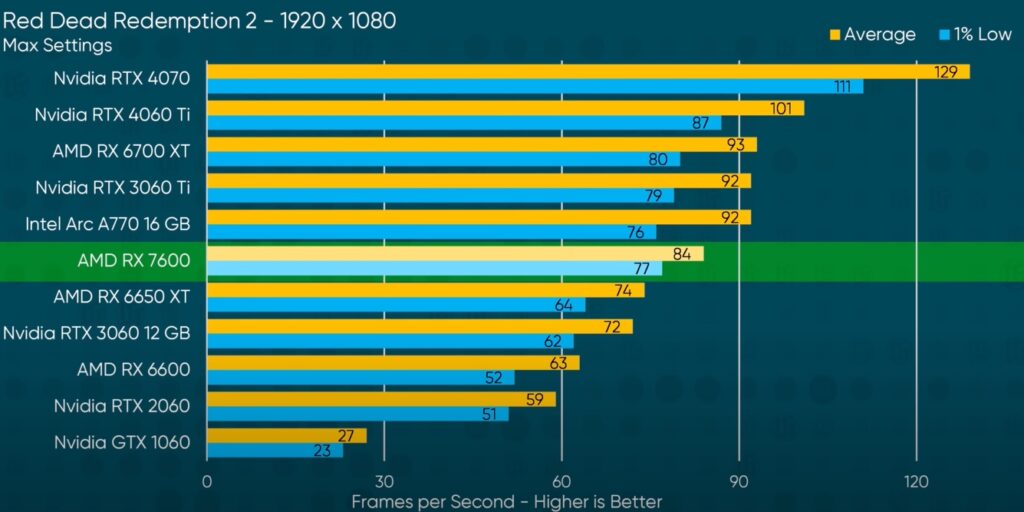
Moving forward, 12GB of VRAM might be the new minimum for those seeking the latest and greatest experience. Even at 1080p, when you have higher settings and stuff like raytracing turned on, 8 gigs do not seem to be enough.
Now, we can’t give AMD too much flame for this as Nvidia is selling the 4060 Ti for $400 with a measly 8GB of VRAM. That card is supposed to be a 1440p gaming beast, but the 8 gigs are holding it back a lot. The cheaper RX 7600 is a great budget gaming card, but make sure that you have your expectations in line. You will have to turn down the setting for some of these newer titles.
Alternatively, you can also get the RX 6700 XT which is likely the more sensible purchase. While it is slightly more expensive, you get more VRAM and better performance. Of course, seem will still lean towards the newer architecture and the benefits that come with that.
Best RX 7600 Graphics Cards - FAQs
For 1080p gaming, the RX 7600 is an excellent graphics card. It has a low power draw and enough raw power to handle most triple-A titles on a high refresh rate 1080p monitor.
While the RX 7600 performs decently at a 1440p resolution, the 8GB VRAM is certainly a limiting factor. Newer games will struggle with only 8GB of available VRAM at higher resolutions.
The RX 7600 is rated for 165W which is much lower than the 6650XT. While a 6700XT might be faster, it also draws more power with a TDP of 230W.
 Check Price
Check Price